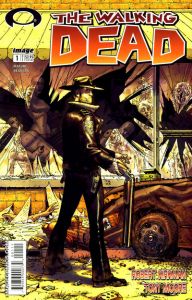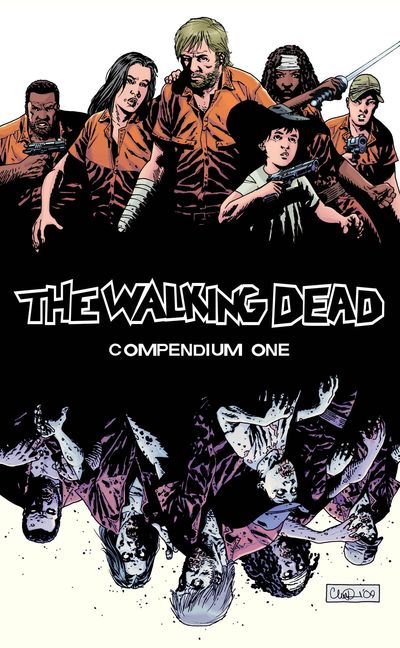 In case you haven't heard, there's a tiny little comic book themed TV show debuting this weekend on AMC called The Walking Dead. Chances are, if you're even passively interested in comic books, you are aware of the existence of said series and the fact it's debuting on Halloween Weekend to the excitement of countless fanboys and fangirls. In fact, iFanboy is even having a party to celebrate the debut if you're in the area.
In case you haven't heard, there's a tiny little comic book themed TV show debuting this weekend on AMC called The Walking Dead. Chances are, if you're even passively interested in comic books, you are aware of the existence of said series and the fact it's debuting on Halloween Weekend to the excitement of countless fanboys and fangirls. In fact, iFanboy is even having a party to celebrate the debut if you're in the area.
As a finance guy who is also a comic book geek, The Walking Dead — and its creator/writer Robert Kirkman — is a fascinating exception to what we've come to accept about the direct market. What I mean by that is Kirkman's two core titles — The Walking Dead and Invincible — defy the predominant trend of declining sales over time. The VAST majority of comic book titles show declines on a fairly consistent basis. For long-running franchises (think Batman or X-Men) that means coming up with a way to goose numbers back and hit the reset button every now and then. So as numbers dwindle they might try a renumbering, an outright relaunch, a new "superstar" creative team or, of course, the obligatory "big event." Sometimes those moves work, sometimes they don't. But most comic book titles launch, subsequent issues never sell as well as #1 did, and eventually either level out or go by the wayside.
But not The Walking Dead. Kirkman's zombie apocalypse epic has been a critical and financial success like no other.
Thanks to our friends at The Beat, we can take a quick look at the last five years of Walking Dead (issues) sales in the direct market:
08/2005: The Walking Dead #21 – 17,66808/2006: The Walking Dead #30 – 20,54008/2007: The Walking Dead #40 – 22,98908/2008: The Walking Dead #51 – 23,12108/2009: The Walking Dead #64 – 24,39308/2010: The Walking Dead #76 – 26,553
6 month (+10.6%)1-year (+8.9%)2-year (+14.8%)3-year (+15.5%)4-year (+29.3%)5-year (+50.3%)
- Buffy the Vampire Slayer — down 28.6%
- The Boys — down 14.8%
- Angel — down 29.7%
- B.P.R.D. — down 8.9%
- Chew — down 7.3%
- G.I. Joe — down 34.6%
- Witchblade — down 38.0%
- Project Superpowers — down 43.7%
- Savage Dragon — down 9.7%
- Usagi Yojimbo — down 29.4%
- In 2009, all 10 existing volumes of The Walking Dead TPB ranked among Diamond's Top 100 Graphic Novels. Three volumes held Top 5 positions.
- In 2008, all 8 existing volumes of The Walking Dead TPB ranked among Diamond's Top 100 Graphic Novels.
- In 2007, all 7 existing volumes of The Walking Dead TPB ranked among Diamond's Top 100 Graphic Novels.
Robert Kirkman’s "Walking Dead" continues to grow in the bookstore market – v9 comes in at a smidge over 14k. That’s roughly half of what it sells in the DM, but that’s still a pretty prodigious number. All ten "Walking Dead" softcover volumes make the Top 750, as does v1 of the hardcover.
 4) The book is widely available — Robert has been at the forefront of embracing new form factors and delivery models. He's got the single issue comics. He's got the trade paperbacks. But he's also got the harcovers, the omnibus editions and the Compendium (pictured). He's just announced plans to reprint each issue starting with #1 on a weekly basis to catch people up. On the digital front, The Walking Dead is available on just about every digital platform. At the end of the day, if there's a way people consume comic books, Robert has tried to make the Walking Dead available in that form.
4) The book is widely available — Robert has been at the forefront of embracing new form factors and delivery models. He's got the single issue comics. He's got the trade paperbacks. But he's also got the harcovers, the omnibus editions and the Compendium (pictured). He's just announced plans to reprint each issue starting with #1 on a weekly basis to catch people up. On the digital front, The Walking Dead is available on just about every digital platform. At the end of the day, if there's a way people consume comic books, Robert has tried to make the Walking Dead available in that form.
Jason is a mutant with the ability to squeeze 36 hours into every 24-hour day, which is why he was able to convince his wife he had time to join the iFanboy team on top of running his business, raising his three sons, and most importantly, co-hosting the 11 O'Clock Comics podcast with his buddies Vince B, Chris Neseman and David Price. If you are one of the twelve people on Earth who want to read about comics, the stock market and football in rapid fire succession, you can follow him on Twitter.


Great post as always, Jason. Another, admittedly, small point in The Walking Dead’s favor, at least in the direct market anyway, is that Kirkman seems (since I don’t know him personally) like a nice guy. I am sure he has pissed off somebody somewhere, but for the most part, people like him. I think he’s his own best ambassador, a la Stan Lee. I think that counts for something in this small insular world that we call comic fandom.
I’d like to thank everyone involved with this site for avoiding spoilers for this series. I MIGHT have bought the book if it had been spoiled, but who can say. (As Jason mentioned, it helps that The Walking Dead solicitations are refreshingly brief.)
I think the fourth point deserves attention. It is much easier to increase sales if people see (and are, therefore, aware of) your book on a consistent basis. Making the book available in every conceivable format is something other publishers and creators need to mimic.
@ctrosejr — Thanks, and yes his demeanor and candor help him, I think. He seems to get an inordinate amount of praise from the blogosphere and podcasting worlds, and I definitely think if he came off as a dick (rather than the fun guy we’ve all come to know and listen to), it would impair the goodwill people feel toward him. But ultimately it’s tough to quantify that because I can think of a ton of beloved creators who are well thought of personally, who write/draw books that are widely praised, and yet they sell depressingly low numbers.
Another great article! I really appreciate the viewpoint and expertise you bring to the table.
And let’s not forget the big Mo — monthly. Sure, Kirkman has had his hiccups, but he still gets 12 issues out a year. So the book becomes a habit. And the assembly line always has fresh material for re-re-re-reprinting.
I really gotta give it to Kirkman, I will admit I am questioning of some of the new things he tries, but the numbers don’t lie.
Walking Dead is a fantastic book. I know its not very business like to think of it as such, but really when this book dropped it just sort of spiraled into the perfect storm. Perfect story, by perfect creators at the perfect time.
I got into The Walking Dead because of number 4, I started seeing The Walking Dead everywhere, in the comiXology, in Amazon Suggestions, here, at the comic store, and then when the TV show hit I knew it was a sign, so I gave in and ordered the Compendium
Why would an exception to an alleged rule prove that rule to be true?
@Camden: Because that’s how the saying goes.
@Camden It’s an old meaning of the word "Prove" that essentially means "Test"
Alright, I forgot to add a 5th bullet…Kirkman = HILARIOUS
Every time I see him on an iFanboy video he cracks me up. This latest NYCC version was no different.